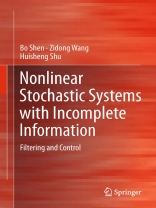Nonlinear Stochastic Processes addresses the frequently-encountered problem of incomplete information. The causes of this problem considered here include: missing measurements; sensor delays and saturation; quantization effects; and signal sampling.
Divided into three parts, the text begins with a focus on H∞ filtering and control problems associated with general classes of nonlinear stochastic discrete-time systems. Filtering problems are considered in the second part, and in the third the theory and techniques previously developed are applied to the solution of issues arising in complex networks with the design of sampled-data-based controllers and filters.
Among its highlights, the text provides:
• a unified framework for filtering and control problems in complex communication networks with limited bandwidth;
• new concepts such as random sensor and signal saturations for more realistic modeling; and
• demonstration of the use of techniques such as the Hamilton–Jacobi–Isaacs, difference linear matrix, and parameter-dependent matrix inequalities and sums of squares to handle the computational challenges inherent in these systems.
The collection of recent research results presented in Nonlinear Stochastic Processes will be of interest to academic researchers in control and signal processing. Graduate students working with communication networks with lossy information and control of stochastic systems will also benefit from reading the book.
Jadual kandungan
From the Contents: Quantized H-infinity Control for Nonlinear Stochastic Time-delay Systems with Missing Measurements.- Nonlinear H-infinity Filtering for Discrete-Time Stochastic Systems with Missing Measurements and Randomly Varying Sensor Delays.- Robust H-infinity Filtering with Randomly Occurring Nonlinearities, Quantization Effects and Successive Packet Dropouts.- H-infinity Filtering with Randomly Occurring Sensor Saturations and Missing Measurements.- Distributed H-infinity Consensus Filtering in Sensor Networks with Multiple Missing Measurements: The Finite-Horizon Case.
Mengenai Pengarang
Zidong Wang is currently Professor of Dynamical Systems and Computing at Brunel University, West London, United Kingdom. From January 1997 to December 1998, he was an Alexander von Humboldt research fellow with the Control Engineering Laboratory, Ruhr-University Bochum, Germany. From January 1999 to February 2001, he was a Lecturer with the Department of Mathematics, University of Kaiserslautern, Germany. From March 2001 to July 2002, he was a University Senior Research Fellow with the School of Mathematical and Information Sciences, Coventry University, U.K. In August 2002, he joined the Department of Information Systems and Computing, Brunel University, U.K., as a Lecturer, and was then promoted to a Reader in September 2003 and to a Chair Professor in July 2007.
Professor Wang’s research interests include dynamical systems, signal processing, bioinformatics, control theory and applications. He has published more than 200 papers in refereed international journals. His publications have received more than 5000 citations (excluding self-citations) with h-index 48. He was awarded the Humboldt research fellowship in 1996 from Alexander von Humboldt Foundation, the JSPS Research Fellowship in 1998 from Japan Society for the Promotion of Science, and the William Mong Visiting Research Fellowship in 2002 from the University of Hong Kong.
Professor Wang serves as an Associate Editor for IEEE Transactions on Automatic Control, IEEE Transactions on Neural Networks, IEEE Transactions on Signal Processing, IEEE Transactions on Systems, Man, and Cybernetics – Part C, IEEE Transactions on Control Systems Technology, Circuits, Systems & Signal Processing, Asian Journal of Control, an Action Editor for Neural Networks, an Editorial Board Member for International Journal of Systems Science, Neurocomputing, International Journal of Computer Mathematics, International Journal of General Systems, and an Associate Editor on the Conference Editorial Board for the IEEE Control Systems Society. He is a Senior Member of the IEEE, a Fellow of the Royal Statistical Society, a member of program committee for many international conferences, and a very active reviewer for many international journals. He was nominated an appreciated reviewer for IEEE Transactions on Signal Processing in 2006-2008 and 2011, an appreciated reviewer for IEEE Transactions on Intelligent Transportation Systems in 2008; an outstanding reviewer for IEEE Transactions on Automatic Control in 2004 and for the journal Automatica in 2000.












